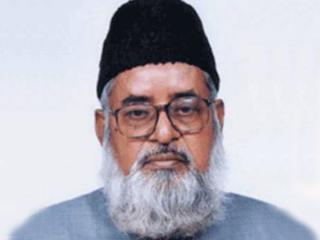Corroborating the evidence of other eyewitnesses, a prosecution witness on Sunday said Jamaat-e-Islami leader Maulana Abdus Sobhan carried out atrocities in two villages of Pabna in collaboration with the Pakistan occupation forces during the 1971 Liberation War, killing several unarmed civilians, including two women.
“On May 11, 1971, Maulana Sobhan boarding a white car followed by an army convoy stormed into village Kolania, Pabna,” recalled Momtaj Uddin Montu, now 66, while testifying as PW-15 before the International Crimes Tribunal-2 against the detained Jamaat leader.
“Seeing the army attack with indiscriminate gunshots, I had hidden into a bush beside the house of Samaz Uddin from where I saw him along with his wife, Rahatan, coming out of their house to take shelter in a bamboo grove, but they couldn’t escape Maulana Sobhan’s eyes,” said the PW.
As a result, army gunned Samuz Uddin down on the spot and injured his wife with bullets following an indication from Maulana Sobhan, said Montu adding, at the same time, another neighbour, Hasina, wife of Amin Uddin, was killed by army while fleeing.
Later, the army had gone to the house of Khoda Buksh and gunned down one Waziuddin of Pabna and several others who took refuge there during the Liberation War, he said.
Referring to local people, the PW told the tribunal that the perpetrators then made a raid on Dogachhi Bazar killing Haripada and Benu there. They had also burned down houses killing many people, he said.
Maulana Sobhan along with his army associates had also stormed the house of Chand Ali Pramanik and torched it, he said adding, that at last the perpetrators had killed 6 people, including Chand Ali, in front of a local mosque.
Before concluding his testimony, PW Montu identified Maulana Sobhan in the dock.
The deposition over, Montu was cross-examined by the defence counsel which remained inconclusive.
On December 31, 2013, the tribunal framed charges against accused Jamaat-e-Islami leader Maulana Sobhan for his involvement in crimes against humanity, including genocide, during the 1971 Liberation War, dismissing his discharge plea.
On September 19, 2013, after perusing the formal charge along with relevant statements and documents submitted by the prosecution, the tribunal took cognisance of the charges against Maulana Sobhan as it found a strong prima facie case against the accused under sections 3(2), 4(1) and 4(2) of the International Crimes (Tribunals) Act 1973.
On September 20, 2012, Sobhan, the number three man in the Jamaat-e-Islami hierarchy, was held by the members of an army intelligence agency at the Bangabandhu Bridge toll plaza in Tangail in connection with a case of violence. Later, the accused was handed over to the police.
The tribunal, upon a prosecution plea, had shown Sobhan arrested in connection with the case of the 1971 crimes against humanity.
According to the prosecution, it received allegations like genocide, rape, arson and looting perpetrated by Sobhan, the then leader of Pabna Peace Committee (collaborator) and Pabna district Jamaat ameer, in collaboration with the Pakistan occupation forces, including Razakar, Al Badr and Al Shams, during the Liberation War.
Sobhan had allegedly played a key role in organising Razakar, Al Badr and Al Shams, the auxiliary forces of the Pakistani junta, in Pabna district.
Meanwhile, prosecution witness-31 Azharul Huq while testifying against war crimes accused former state minister SM Qaiser, now enjoying bail, accused the cohorts of Qaiser of injuring his mother and nephew at their house by rifle butts.
Narrating the atrocities carried out by Qaiser, the PW told the tribunal that on November 15 in 1971 Qaiser in association with the Pakistan occupation army had launched operation in 22 villages killing 108 unarmed civilians and torching and plundering over 400 houses.
Hailing from village Noorpur of Nasirnagar in Brahmanbaria, PW Azharul was also cross-examined by defence counsel Abdus Sobhan Tarafder partly after his deposition.
Source: UNBConnect

